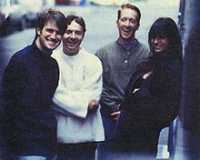Formed: Boston, 1986.
As the 90s have progressed, Buffalo Tom have grown from being categorized as another college-rock three-piece of the Hüsker Dü/ Dinosaur Jr. lineage to critical acceptance as a genuine force that has somehow eluded the mainstream. The trio of Bill Janowitz (vocals/guitar), Chris Colbourn (bass/vocals) and Tom Maginnis (drums) formed at the University of Massachusetts in the mid-80s and gelled into a solid unit that has remained unbroken.
Their eponymous first album was released on SST in 1989 and relied on raw, fresh power chords, exemplified in the searing opener, "Sunflower Suit" and the dynamic but melodic "Impossible". There were ample signs of the songwriting talents of Janowitz and Colbourn and of the band's ability to vary the pace, but they were largely written off as Dinosaur Jr. junior, a criticism given force by the fact that J. Mascis himself produced their early output.
They ploughed on regardless and secured a faithful following on the US college circuit and in indie circles on both sides of the Atlantic. They had the advantage of a strong camaraderie that showed in the special chemistry of their live shows. They even grinned and bore the stage-diving. Their second album, Birdbrain, released on Beggars Banquet in 1990, showed the band - and Janowitz in particular - getting to grips with the personal angst and alienation that was to recur throughout their later material, while the shimmering sound and more complex rhythm structure of "Baby" demonstrated the musical broadening that was to feature later too. By 1992 the group had done some solid touring in Europe and other parts of the world and had signed to a major label, RCA.
It was the release of Let Me Come Over that year which raised the band's profile and attracted acclaim in the music press. Hardly surprising, as the record was a minor classic, showing the increased maturity of the two songwriters and a lighter musical touch than the band had been thought capable of. "Taillights Fade", a power ballad that opens gently and reaches a soul-wrenching crescendo, became a standard request on alternative rock stations, and "Mineral" had a wistful folkier strand woven round a delicious melody. Sadly, however, the album didn't sell as well as it deserved.
The following year saw the band take a fair break from touring to allow more time in the studio and they spent a couple of months in LA with the experienced Robb Brothers, who had worked with the likes of Rod Stewart and Steely Dan, to produce Big Red Letter Day. A lot more trouble was taken over the production and there was careful layering and dubbing to give a richer sound, yet some of the band's passion was lost, as if they felt inhibited by big studio techniques. The material, however, was fine, in essence very similar to that of Let Me Come Over but without the high peaks. The extent to which the group is the centrepiece of each member's creativity was shown by Bill Janowitz's solo acoustic tour in 1994, which consisted wholly of Buffalo Tom songs or covers, all played with his natural humility yet magnetic force.
Their latest album, Sleepy-Eyed, was released at around the time of the band's excellent set at the Reading Festival in 1995, and was perhaps their finest effort to date. Recorded at Dreamland, a converted church in Woodstock, it struck a fine balance between crisp freshness, as in the opener and single, "Tangerine", melodic pop sensibility, as in "Kitchen Door", and passionate grandeur, displayed in full measure on "Sparklers" and the magnificent "Sunday Night". All this suggested that we may not have heard the best of Buffalo Tom yet. As Chris Colbourn put it, 'Over the last couple of years we've stopped watching MTV and started realising our own place in the world.'
Source: [The Rough Guide To Rock](The Rough Guide To Rock)
